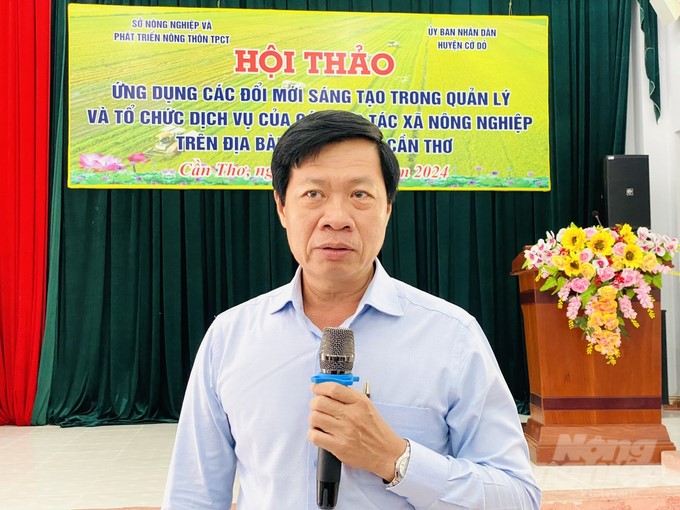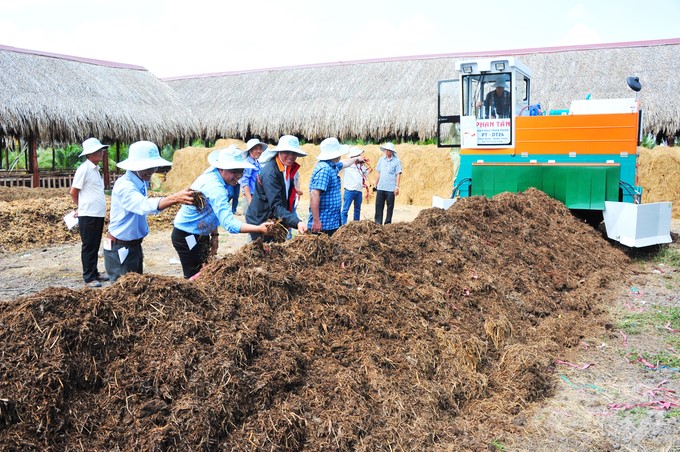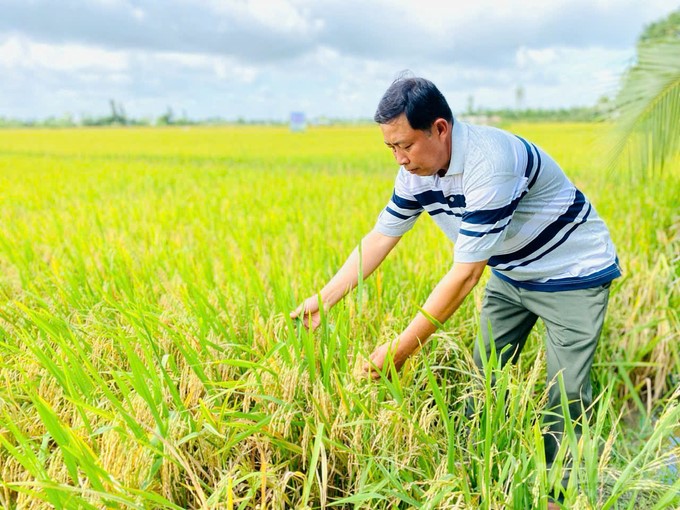June 15, 2025 | 20:36 GMT +7
June 15, 2025 | 20:36 GMT +7
Hotline: 0913.378.918
June 15, 2025 | 20:36 GMT +7
Hotline: 0913.378.918

According to Mr. Nguyen Tan Nhon, Deputy Director of the Can Tho Department of Agriculture and Rural Development, the GIC project helps farmers and cooperatives change their thinking from agricultural production to agricultural economics to increase income. Photo: Le Hoang Vu.
Can Tho City is one of six Mekong Delta provinces and cities selected by the Ministry of Agriculture and Rural Development to participate in the "Green Innovation Center (GIC) Project for the 2021-2024 period." The GIC project's goal is to promote and replicate innovative and creative models and solutions through many different agricultural products, contributing to sustainable rural development in the Mekong Delta.
Mr. Nguyen Tan Nhon, Deputy Director of the Can Tho Department of Agriculture and Rural Development, said that to implement the GIC project, the agricultural sector has coordinated with relevant units and localities to select 10 typical rice production cooperatives in Thoi Lai, Vinh Thanh, and Co Do districts to participate in the project. Accordingly, the Department has supported cooperatives to produce rice according to sustainable standards (SRP), reducing CO2 emissions, and organized 49 business training classes for farmers (FBS). At the same time, organize 40 Integrated Pest Management (IPM) training classes for about 1,200 rice farmers in cooperatives and linked production households. Organize 8 capacity-building classes for cooperative managers. In addition, organize on-site workshops to evaluate the model and guide cooperatives to connect to the market.
Thereby, helping farmers in agricultural cooperatives gradually change production practices towards reducing greenhouse gas emissions and meeting market requirements. At the same time, help farmers and cooperatives change their thinking from agricultural production to agricultural economics to increase income.

Nhan Loi Cooperative in Vinh Thanh district was supported by the GIC project with an organic fertilizer mixer and supported to produce according to SRP standards. Photo: Le Hoang Vu.
In 2022, Thuan Thang Cooperative (Dong Thuan commune, Thoi Lai district) is one of 10 cooperatives in Thoi Lai district selected by the city to participate in the GIC project.
Mr. Duong Van Sieu, Deputy Director of Thuan Thang Cooperative, said: The Cooperative was established in 2017 and is located in the key rice production area of Thoi Lai district. Up to now, the Cooperative has 26 official members with a total rice production area of 80 hectares, specializing in rice cultivation of 3 crops/year. The Cooperative has 52.08 hectares of VietGAP-certified farming area and will continue to expand in the coming time.
In addition to rice production, the Cooperative also deploys other services such as seeds, fertilizers, and land preparation and harvesting machinery. Every year, the Cooperative acts as a center to link output with rice purchasing businesses, ensuring stable output for participating members at reasonable prices. Currently, the Cooperative has continuously developed and increased the application of scientific and technical advances in production, moving towards meeting safe production standards and increasingly meeting consumer market and export needs. The ultimate goal is to help members and farmers produce stably, achieve increasing profits, and know how to get rich on their own land.
In recent times, the Cooperative has been supported by all levels and branches in training on knowledge and techniques of "1 must 5 reductions," "3 reductions, 3 increases" rice production in the direction of organic safety, and participating in project activities. Besides, the Cooperative has been trained to produce according to SRP standards, supported in production models based on low-carbon credits, and supported in capacity-building training for cooperative managers. Especially, people in the Cooperative are trained on FBS classes by the project.
Previously, people only cared about rice production to produce as high a yield as possible, but FBS classes have helped farmers have a different view and gradually change their thinking in agricultural production.

At Thanh Phu Cooperative, GIC's support in business training for farmers has helped improve knowledge of management organization, administration, and business linkages in product consumption. Photo: Le Hoang Vu.
As for Thanh Phu Cooperative in Co Do district, the GIC project's support in opening business training classes for farmers (FBS) has helped farmers improve their knowledge of management organization, administration, business linkages, developing mid-term plans, financial management, and marketing.
Mr. Nguyen Danh Dung, Director of Tien Dung Agricultural Cooperative, said: Through the training course on skills of negotiating and signing product consumption contracts, the Cooperative has promoted the proactivity in finding companies and businesses to sign product consumption contracts. As a result, in this year's winter-spring and summer-autumn crops, the Cooperative signed with Loc Troi Group and Thanh Hung Co., Ltd. with an average area of 220 hectares/crop of 101 households producing more than 2,800 tons of fresh rice. The linkage has helped stabilize output so that people can feel secure in their production, no longer subject to price squeezing from traders or difficulty in selling products until harvest time.
"In addition, the linkage with the company has increased people's income by VND 300,000-500,000/ha, thereby making people excited and enthusiastic to participate in the Cooperative's rice consumption work. Since then, gradually form production linkages according to market requirements and limit spontaneous and small-scale production," said Mr. Dung.
Translated by Thu Huyen
![Turning wind and rain into action: [4] Bringing climate bulletins to remote and isolated areas](https://t.ex-cdn.com/nongnghiepmoitruong.vn/608w/files/linhnhp/2025/06/14/1152-z6704423696987_15fd32ffc26d590d204d520c9dac6786-nongnghiep-151141.jpg)
(VAN) The Vietnam Agriculture and Nature Newspaper interviewed Mr. Vu Thai Truong, Acting Head of Climate Change and Environment at UNDP Vietnam, to gain deeper insight into how climate bulletins are delivered to farmers.

(VAN) In Tien Giang, a high-tech shrimp farm has developed a distinctive energy-saving farming model that has yielded promising results.
![Turning wind and rain into action: [3] 300.000 farmers benefit from agro-climatic bulletins](https://t.ex-cdn.com/nongnghiepmoitruong.vn/608w/files/news/2025/06/12/e5a48259d6a262fc3bb3-nongnghiep-125122.jpg)
(VAN) The agro-climatic bulletin has become a valuable tool for farmers in the Mekong Delta. After more than five years of implementation, the initiative is gradually being expanded nationwide.
![Turning wind and rain into action: [2] Providing forecasts to the people](https://t.ex-cdn.com/nongnghiepmoitruong.vn/608w/files/news/2025/06/12/e5a48259d6a262fc3bb3-nongnghiep-103927.jpg)
(VAN) In addition to improving the quality of hydrometeorological forecasts, putting forecast bulletins into practical use is crucial for production and disaster prevention.

(VAN) Blue carbon is receiving attention for its rapid absorption capacity and vast potential. It represents a promising nature-based solution to respond to climate change.
/2025/06/11/3507-1-161904_583.jpg)
(VAN) Seagrass beds and coral reefs serve as 'cradles' that nurture life in the ocean depths, creating rich aquatic resources in Vietnamese waters.
![Turning wind and rain into action: [1] Forecasting for farmers](https://t.ex-cdn.com/nongnghiepmoitruong.vn/608w/files/news/2025/06/11/e5a48259d6a262fc3bb3-nongnghiep-111919.jpg)
(VAN) Weather is no longer just a matter of fate. Forecasts have now become an essential companion for farmers in every crop season.